The National Biotechnology Research and Development Agency (NBRDA), on Wednesday, May 8, 2024, sensitised farmers, extension agencies, MDAs, academia and students in Southeast on advancement of biotechnology and biosafety.

The workshop, which held at the Godfrey Okoye University (GOUNI), Enugu, was organised by the Open Forum on Agricultural Biotechnology (OFAB) in Africa, Nigeria Chapter.
It is also an initiative of the African Agricultural Technology Foundation (AATF).
The event was tagged One-Day Biosafety and Biotechnology Sensitisation Workshop for the South East zone with the theme “Genetic Modified Food Safety Stewardship: Fortifying Public Confidence”.
Addressing participants, the Director General and Chief Executive Officer of NBRDA, Prof. Mustapha Abdullahi, noted that the South East region had immense potential for the advancement of biotechnology and biosafety practices.
He said that the workshop would serve as an important platform to collectively explore and harness those potential in biotechnology for the benefits of all.
According to him, biotechnology holds the key to addressing some of the most pressing challenges facing agriculture, healthcare, the environment and beyond.
“From enhancing crop yields and improving food security to developing innovative medical treatments and mitigating the impacts of climate change, the potential applications of biotechnology are vast and far-reaching.
“Through this sensitisation workshop, we aim to deepen our understanding of biosafety regulations, biotechnological advancements, and their implications for Nigeria.
“By fostering dialogue, sharing best practices, and raising awareness, we can empower stakeholders at all levels to make informed decisions and participate meaningfully in the biotechnology revolution unfolding before us,” he said.
He further told the participants that their contributions were invaluable to the success of the workshop and the advancement of biotechnology and biosafety in Nigeria.
“My appeal to everyone is to contribute their best as we try to fashion out strategies on how to ensure that the country is food-secured.”
While thanking partners, Abdullahi added that as stewards of science and technology, they had a responsibility to ensure that their actions were guided by principles of safety, sustainability, and social responsibility.
Welcoming the stakeholders, the Vice Chancellor of GOUNI, Prof. Christian Anieke, said the workshop came in at the right time given the food insecurity faced by Nigerians that were on increases on daily basis.
Anieke, represented by the Deputy Vice Chancellor Administration, Gozie Ogbodo, explained that biotechnology had wide application to the improvement of life of anything that had DNA, rising from Agriculture, environment, medicine and others.
He said that it improved productivity, properties of food crops and flowers, adding that to achieve economic understanding, adoption and acceptance of biotechnology, it was important to sensitize the zone on the benefits.
“GOUNI had always been in the fore front of advancement of biotechnology in Nigeria as it offers biotechnology as a course with approved curriculum by the National University Commission.
“The university is the only DNA learning centre in Africa and seven in the world, as biotechnology will improve productivity, quality of food crops and income of the farmers,” Anieke said.
Also speaking, the Country Coordinator, PSB, Nigeria, Dr Mathew Dore, said they were working in Enugu on cassava to be more productive and develop resistance to challenges and environment.
“We are working on how we can make cassava richer as biotechnology is being used for cassava while cowpea and maize is about 5 years old in the country.
“It took time to multiply the seeds which needed to go round to farmers in the rural areas,” he noted.
Dr Ayo Enwerem, Chairman, All Farmers Association of Nigeria (AFAN), Imo State Chapter, revealed that it had been more than 20 years since the issue of genetic improved crops came up, but they had never been given the seeds, stressing that farmers could not find them.
Enwerem requested for the seed to be given to farmers to enable them to multiply the seed.
By Alex Enebeli
